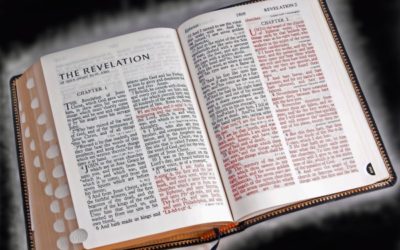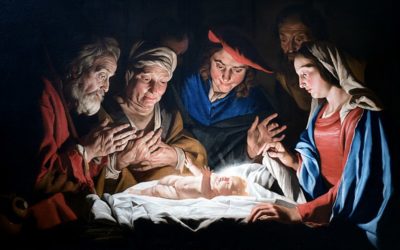In the scriptures and Church history, opposition is often followed by great blessings in an endless cycle of spiritual growth. As William Phelps wrote in “Praise to the Man,” “Sacrifice brings forth the blessings of heaven.” The opposition that Joseph Smith and Sidney Rigdon faced in the winter of 1831‒1832 was followed by a stunning vision to them on February 16, 1832 while they were at the home of John and Elsa Johnson, where Joseph and Emma were then living. The revelation came as Joseph and Sidney were translating the New Testament and encountered John 5:28‒29.
“Marvel not at this,” Jesus said in these verses after testifying of His Father, “for the hour is coming, in the which all that are in the graves shall hear his voice, and shall come forth; they that have done good, unto the resurrection of life; and they that have done devil, unto the resurrection of damnation.”
Vision of the Father, and Son, and Holy Angels
“Now this caused us to marvel, for it was given unto us of the Spirit,” wrote Joseph and Sidney in the revelation that people at the time called “The Vision” and is now section 76 of the Doctrine and Covenants. “And while we meditated upon these things, the Lord touched the eyes of our understandings and they were opened, and the glory of the Lord shone round about. And we beheld the glory of the Son, on the right hand of the Father, and received of his fulness; and saw the holy angels, and them who are sanctified before his throne, worshiping God, and the Lamb, who worship him forever and ever.” (Verse 18‒21.)
Joseph saw the Father, the Son, and holy angels in his First Vision of 1820. He saw them again—this time with Sidney—in this 1832 vision, leading the two Church leaders to bear witness of what they saw, especially of the Savior. “And now,” they wrote, “after the many testimonies which have been given of him, this is the testimony, last of all, which we give of him: That he lives! For we saw him, even on the right hand of God; and we heard the voice bearing record that he is the Only Begotten of the Father—that by him, and through him, and of him, the worlds are and were created, and the inhabitants thereof are begotten sons and daughters unto God.” (Verses 22‒24.)
The last point, that the worlds’ inhabitants are “begotten sons and daughters unto God,” established that we are all children of our Heavenly Father, women and men alike.
Opposition, Satan, and His Fall from Heaven
When Joseph knelt to pray before his First Vision in 1820, he felt the presence of Satan trying to prevent him from having a mighty spiritual experience. We often face opposition before spiritual opportunities. While on the Hill Cumorah for his first view of the golden plates in 1823, Joseph saw a vision of Satan that impressed him throughout his life with the contrast between good and evil. Now in section 76, he and Sidney saw another vision of the fallen angel.
“And this we saw also, and bear record,” they wrote, “that an angel of God who was in authority in the presence of God, who rebelled against the Only Begotten Son whom the Father loved and who was in the bosom of the Father, was thrust down from the presence of God and the Son, and was called Perdition, for the heavens wept over him—he was Lucifer, a son of the morning. And we beheld, and lo, he is fallen! is fallen, even a son of the morning!” (Verses 25‒27.)
Joseph could not write down certain aspects of visions he had. For example, in his First Vision, he “saw many angels” but never wrote about them in detail, saying also he was told many things “which I cannot write at this time.”
There were things he and Sidney saw in the section 76 vision that they could not record (verses 114‒18). But the Lord expressly commanded them to write some things, including their vision of Satan and what happens to those overcome by him. “And while we were yet in the Spirit, the Lord commanded us that we should write the vision,” Joseph and Sidney recorded, “for we beheld Satan, that old serpent, even the devil, who rebelled against God, and sought to take the kingdom of our God and his Christ—Wherefore, he maketh war with the saints of God, and encompasseth them round about.” (Verses 28‒29.)
The Sons of Perdition
Among those Joseph and Sidney saw in vision were the sons of perdition, meaning the sons of Satan (see verse 26). “And we saw a vision of the sufferings of those with whom he made war and overcame,” they wrote, “for thus came the voice of the Lord unto us: Thus saith the Lord concerning all those who know my power, and have been made partakers thereof, and suffered themselves through the power of the devil to be overcome, and to deny the truth and defy my power. They are they who are the sons of perdition, of whom I say that it had been better for them never to have been born.” (Verses 30‒32.)
Why was it “better for them never to have been born”? Don’t those who are born receive bodies, unlike Satan and those who followed him in the premortal life, making them better off than those never born? Apparently, sons of perdition lose whatever benefit birth gave them and become “vessels of wrath, doomed to suffer the wrath of God, with the devil and his angels in eternity” (verse 33). Unlike others who can obtain forgiveness in the spirit world (Doctrine and Covenants 138:31‒34), sons of perdition receive “no forgiveness in this world nor in the world to come” (D&C 76:34).
According to section 76, “These are they who shall go away into the lake of fire and brimstone, with the devil and his angels—and the only ones on whom the second death shall have any power; yea, verily, the only ones who shall not be redeemed in the due time of the Lord, after the sufferings of his wrath. For all the rest shall be brought forth by the resurrection of the dead, through the triumph and the glory of the Lamb, who was slain, who was in the bosom of the Father before the worlds were made.” (Verses 36‒39.)
Becoming a son of perdition requires: (1) denying “the Holy Spirit after having received it” (verse 34) and (2) denying “the Only Begotten Son of the Father, having crucified him unto themselves and put him to an open shame” (verse 35).
The Gospel: Glad Tidings
The fate of the sons of perdition would be the fate of us all were it not for the atoning sacrifice of Jesus Christ. The word “gospel” means good news or glad tidings. Joseph and Sidney declared the good news they learned in the vision. “And this is the gospel, the glad tidings, which the voice out of the heavens bore record unto us—that he came into the world, even Jesus, to be crucified for the world, and to bear the sins of the world, and to sanctify the world, and to cleanse it from all unrighteousness; that through him all might be saved whom the Father had put into his power and made by him; who glorifies the Father, and saves all the works of his hands, except those sons of perdition who deny the Son after the Father has revealed him.” (Verses 40‒43.)
The sons of perdition are the only persons born on earth who are not ultimately saved in one form or another through the atonement of Jesus Christ. The Third Article of Faith declares, “We believe that through the Atonement of Christ, all mankind may be saved, by obedience to the laws and ordinances of the Gospel.” The sons of perdition have the opportunity to be saved when they are first born on earth. But somewhere along the way, they forfeit that opportunity by disobeying the laws and ordinances so fully that they are no longer redeemable.
The Sufferings of the Ungodly
As Joseph and Sidney wrote in their record of the vision, Christ “saves all except them—they shall go away into everlasting punishment, which is endless punishment, which is eternal punishment, to reign with the devil and his angels in eternity, where their worm dieth not, and the fire is not quenched, which is their torment” (verse 44).
Although Joseph and Sidney saw the sufferings of the ungodly sons of perdition, they could not fully explain it. “And the end thereof, neither the place thereof, nor their torment, no man knows,” section 76 relates, “neither was it revealed, neither is, neither will be revealed unto man, except to them who are made partakers thereof; nevertheless, I, the Lord, show it by vision unto many, but straightway shut it up again; wherefore, the end, the width, the height, the depth, and the misery thereof, they understand not, neither any man except those who are ordained unto this condemnation.” (Verses 45‒48.)
Even though they could not explain these sufferings fully, Joseph and Sidney were among those permitted to see them briefly. Then the voice of the Lord commanded them, “Write the vision, for lo, this is the end of the vision of the sufferings of the ungodly” (verse 49).
The Celestial Kingdom
Joseph and Sidney also were blessed to see the celestial kingdom and be permitted to write about it. “We bear record,” they wrote, “for we saw and heard,” meaning the vision had visual and sound aspects to it. The blessing that God’s children can reach the celestial kingdom is part of “the gospel of Christ,” or good news, they testified. (Verse 50.)
Requirements for Entering the Celestial Kingdom
They learned that those who reach the celestial kingdom are they who:
• “received the testimony of Jesus” (verse 51),
• “believed on his name” (verse 51),
• “and were baptized after the manner of his burial, being buried in the water in his name, and this according to the commandment which he has given” (verse 51), “that by keeping the commandments they might be washed and cleansed from all their sins” (verse 52),
• “and receive the Holy Spirit by the laying on of the hands of him who is ordained and sealed unto this power” (verse 52),
• “who overcome by faith” (verse 53),
• “and are sealed by the Holy Spirit of promise, which the Father sheds forth upon all those who are just and true” (verse 53).
Blessings for Those Who Reach the Celestial Kingdom
Those who reach the celestial kingdom will enjoy the following blessings:
• They will “come forth in the resurrection of the just” (verses 50 and 65), also known as “the first resurrection” (verse 64).
• “They are they who are the church of the Firstborn” (verse 54).
• “They are they into whose hands the Father has given all things” (verse 55). “Wherefore, all things are theirs, whether life or death, or things present, or things to come, all are theirs and they are Christ’s, and Christ is God’s” (verse 59).
• “They are they who are priests and kings, who have received of his fulness, and of his glory” (verse 56).
• They “are priests of the Most High, after the order of Melchizedek, which was after the order of Enoch, which was after the order of the Only Begotten Son” (verse 57).
• “Wherefore, as it is written, they are gods, even the sons of God” (verse 58).
• “They shall overcome all things” (verse 60).
• “These shall dwell in the presence of God and his Christ forever and ever” (verse 62).
• “These are they whom he shall bring with him, when he shall come in the clouds of heaven to reign on the earth over his people” (verse 63).
• “These are they who are come unto Mount Zion, and unto the city of the living God, the heavenly place, the holiest of all” (verse 66).
• “These are they who have come to an innumerable company of angels, to the general assembly and church of Enoch, and of the Firstborn” (verse 67; see also verse 94).
• “These are they whose names are written in heaven, where God and Christ are the judge of all” (verse 68).
• “These are they who are just men made perfect through Jesus the mediator of the new covenant, who wrought out this perfect atonement through the shedding of his own blood” (verse 69).
• “They see as they are seen, and know as they are known, having received of his [the Father’s] fulness and of his grace” (verse 94).
• “And he [the Father] makes them equal in power, and in might, and in dominion” (verse 95).
• “These are they whose bodies are celestial, whose glory is that of the sun, even the glory of God, the highest of all, whose glory the sun of the firmament is written of as being typical” (verse 70).
“And thus,” Joseph and Sidney recorded, “we saw the glory of the celestial, which excels in all things—where God, even the Father, reigns upon his throne forever and ever, before whose throne all things bow in humble reverence, and give him glory forever and ever” (verses 92‒93).
“Wherefore,” Joseph and Sidney testified, “let no man glory in man, but rather let him glory in God, who shall subdue all enemies under his feet” (verse 61).
The Terrestrial Kingdom
In their vision, Joseph and Sidney also saw the terrestrial kingdom and observed that its glory was like that of the moon compared to the sun-like glory of the celestial kingdom. “And again,” they recorded, “we saw the terrestrial world, and behold and lo, these are they who are of the terrestrial, whose glory differs from that of the church of the Firstborn who have received the fulness of the Father, even as that of the moon differs from the sun in the firmament” (verse 71).
As Joseph and Sidney did in describing the celestial kingdom, they also described who merited the terrestrial kingdom:
• “These are they who are not valiant in the testimony of Jesus; wherefore, they obtain not the crown over the kingdom of our God” (verse 79).
• “These are they who died without law” (verse 72).
• “They who are the spirits of men kept in prison, whom the Son visited, and preached the gospel unto them, that they might be judged according to men in the flesh: who received not the testimony of Jesus in the flesh, but afterwards received it” (verses 73‒74).
• “These are they who are honorable men of the earth, who were blinded by the craftiness of men” (verse 75).
They also described the blessings received by those who inherit terrestrial glory:
• “They . . . receive of his [Christ’s] glory, but not of his fulness” (verse 76).
• “They . . . receive of the presence of the Son, but not of the fulness of the Father” (verse 77).
• They receive “the ministration of the celestial” kingdom (verse 87).
• “They are bodies terrestrial, and not bodies celestial, and differ in glory as the moon differs from the sun” (verse 78)
As when they viewed the celestial kingdom, Joseph and Sidney were commanded to record their vision of the terrestrial. “And now,” they wrote, “this is the end of the vision which we saw of the terrestrial, that the Lord commanded us to write while we were yet in the Spirit” (verse 80). It is interesting that they did their writing “while we were yet in the Spirit,” not waiting until their spiritual experience ended to record what they saw.
The Telestial Kingdom
Finally, Joseph and Sidney also saw the telestial kingdom and recorded their experience. “And again,” they wrote, “we saw the glory of the telestial, which glory is that of the lesser, even as the glory of the stars differs from that of the glory of the moon in the firmament” (verse 81).
They recorded two basic qualifications for those who received this telestial kingdom of glory:
• First, telestial persons “received not the gospel of Christ, neither the testimony of Jesus” (verse 82). They may have belonged to various religious groups on earth (verses 99‒100), but they “received not the gospel, neither the testimony of Jesus, neither the prophets, neither the everlasting covenant” (verse 101).
• Second, and to their credit, they did not “deny . . . the Holy Spirit” (verse 83).
What is their reward? Joseph and Sidney explained:
• Because of their unrepentant earthly sins, including sexual sins and dishonesty (verse 103), they will “suffer the wrath of God on earth” (verse 104).
• “They . . . are thrust down to hell” (verse 84). That is, instead of going to paradise after they die, they go to spirit prison to await the resurrection. There they will “suffer the vengeance of eternal fire” (verse 105). Being “cast down to hell,” they will “suffer the wrath of Almighty God, until the fulness of times” (verse 106).
• “They . . . will not be gathered with the saints, to be caught up unto the church of the Firstborn, and received into the cloud” at Christ’s second coming (verse 102).
• “They . . . shall not be redeemed from the devil until the last resurrection, until the Lord, even Christ the Lamb, shall have finished his work” (verse 85), “until the fulness of times, when Christ shall have subdued all enemies under his feet, and shall have perfected his work; when he shall deliver up the kingdom, and present it unto the Father, spotless, saying: I have overcome and have trodden the wine-press alone, even the wine-press of the fierceness of the wrath of Almighty God” and when he shall “be crowned with the crown of his glory, to sit on the throne of his power to reign forever and ever” (verses 106‒108).
• After undergoing their required suffering, ultimately “these all shall bow the knee, and every tongue shall confess to him who sits upon the throne forever and ever” (verse 110). As a repentant Alma the Younger explained in the Book of Mormon, “Every knee shall bow, and every tongue confess before him. Yea, even at the last day, when all men shall stand to be judged of him, then shall they confess that he is God; then shall they confess, who live without God in the world, that the judgment of an everlasting punishment is just upon them; and they shall quake, and tremble, and shrink beneath the glance of his all-searching eye.” (Mosiah 27:31.)
• Then “they shall be judged according to their works, and every man shall receive according to his own works, his own dominion, in the mansions which are prepared” (D&C 76:111).
• “And they shall be servants of the Most High; but where God and Christ dwell they cannot come, worlds without end” (verse 112).
• “They . . . receive not of his [Christ’s] fulness in the eternal world, but of the Holy Spirit through the ministration of the terrestrial” (verse 86).
• The ministration they receive includes “the administering of angels who are appointed to minister for them, or who are appointed to be ministering spirits for them” (verse 88).
• Finally, being resurrected and receiving the telestial glory means “they shall be heirs of salvation” (verse 88). That is, they will have bodies and not be perpetually subject to the control of Satan as the sons of perdition will be.
Joseph and Sidney saw that although the glories of the celestial, terrestrial, and telestial worlds each had a unifying oneness within themselves (see verses 96‒98), the telestial had considerable diversity in glory. “For as one star differs from another star in glory, even so differs one from another in glory in the telestial world” (verse 98). They “saw the glory and the inhabitants of the telestial world, that they were as innumerable as the stars in the firmament of heaven, or as the sand upon the seashore” (verse 109).
All Three Kingdoms Are Kingdoms of Glory
What Joseph and Sidney beheld in their great vision of February 16, 1832, proved religiously revolutionary. Through the atonement of Christ, virtually all humanity (except sons of perdition) would be saved in a kingdom of glory. Joseph and Sidney saw that even the lowest of the three kingdoms, the telestial, “surpasses all understanding” (verse 89), “and no man knows it except him to whom God has revealed it” (verse 90), as He did to them. They saw also that “the glory of the terrestrial . . . excels in all things the glory of the telestial, even in glory, and in power, and in might, and in dominion” (verse 91), and that “the glory of the celestial . . . excels in all things” (verse 92).
They Saw More Than They Could Write
After writing what they were allowed to record, Joseph and Sidney concluded, “This is the end of the vision which we saw, which we were commanded to write while we were yet in the Spirit” (verse 113). Yet as with Joseph’s First Vision and other experiences, they were not allowed to write everything they saw, both because they were forbidden and because such things cannot be comprehended by those not specially imbued with the Spirit.
“Great and marvelous are the works of the Lord,” they wrote, “and the mysteries of his kingdom which he showed unto us, which surpass all understanding in glory, and in might, and in dominion; which he commanded us we should not write while we were yet in the Spirit, and are not lawful for man to utter; neither is man capable to make them known, for they are only to be seen and understood by the power of the Holy Spirit, which God bestows on those who love him, and purify themselves before him; to whom he grants this privilege of seeing and knowing for themselves; that through the power and manifestation of the Spirit, while in the flesh, they may be able to bear his presence in the world of glory” (verses 114‒18).
Having seen in vision God’s work and glory manifest, Joseph and Sidney ended their record of their vision declaring, “And to God and the Lamb be glory, and honor, and dominion forever and ever. Amen.” (Verse 119.)
Photo credit for image at top of page: Stock photo from depositphotos.com.



